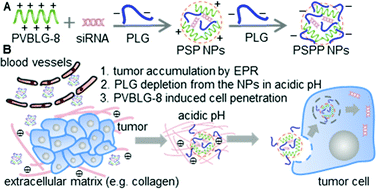Systemic siRNA delivery to tumors by cell-penetrating α-helical polypeptide-based metastable nanoparticles†
Abstract
Systemic, non-viral siRNA delivery for cancer treatment is mainly achieved via condensation by cationic materials (e.g., lipids and cationic polymers), which nevertheless, suffers from poor serum stability, non-specific tissue interaction, and unsatisfactory membrane activity against efficient in vivo gene knockdown. Here, we report the design of a metastable, cancer-targeting siRNA delivery system based on two functional polymers, PVBLG-8, a cationic, helical cell-penetrating polypeptide, and poly(L-glutamic acid) (PLG), an anionic random-coiled polypeptide. PVBLG-8 with rigid, linear structure showed weak siRNA condensation capability, and PLG with flexible chains was incorporated as a stabilizer which provided sufficient molecular entanglement with PVBLG-8 to encapsulate the siRNA within the polymeric network. The obtained PVBLG-8/siRNA/PLG nanoparticles (PSP NPs) with positive charges were sequentially coated with additional amount of PLG, which reversed the surface charge from positive to negative to yield the metastable PVBLG-8/siRNA/PLG@PLG (PSPP) NPs. The PSPP NPs featured desired serum stability during circulation to enhance tumor accumulation via the enhanced permeability and retention (EPR) effect. Upon acidification in the tumor extracellular microenvironment and intracellular endosomes, the partial protonation of PLG on PSPP NPs surface would lead to dissociation of PLG coating from NPs, exposure of the highly membrane-active PVBLG-8, and surface charge reversal from negative to positive, which subsequently promoted tumor penetration, selective cancer cell internalization, and efficient endolysosomal escape. When siRNA against epidermal growth factor receptor (EGFR) was encapsulated, the PSPP NPs showed excellent tumor penetration capability, tumor cell uptake level, EGFR silencing efficiency, and tumor growth inhibition efficacy in U-87 MG glioblastoma tumor spheroids in vitro and in xenograft tumor-bearing mice in vivo, outperforming the PSP NPs and several commercial reagents such as Lipofectamine 2000 and poly(L-lysine) (PLL). This study therefore demonstrates a facile and unique design approach of metastable and charge reversal NPs, which overcomes multiple biological barriers against systemic siRNA delivery toward anti-cancer treatment.



 Please wait while we load your content...
Please wait while we load your content...